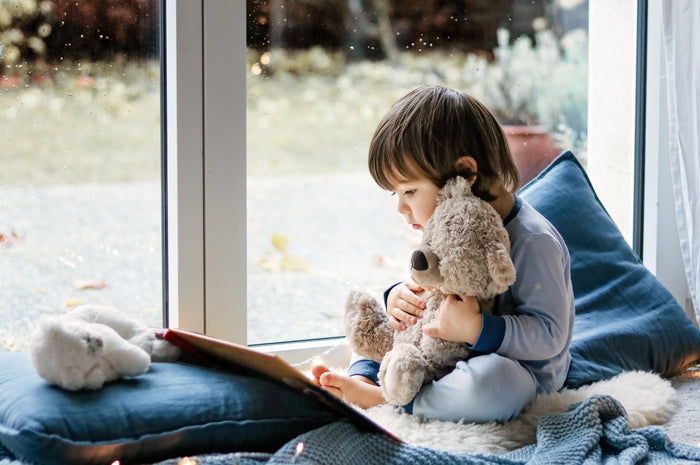For Extroverts: 15 Ways to Be a Better Parent to Your Introverted Kid

You’re confused by your kid. She doesn’t act the way you did when you were growing up. She’s hesitant and reserved. Instead of diving in to play, she’d rather stand back and watch the other kids. She talks to you in fits and starts—sometimes she rambles on, telling you stories, but other times, she’s silent, and you can’t figure out what’s going on in her head. She spends a lot of time alone in her bedroom. Her teacher says he wishes she’d participate more in class. Her social life is limited to two people. Even weirder, she seems totally okay with that.
Congratulations: you’ve got an introvert.
It’s not unusual for extroverted parents to worry about their introverted children and even wonder if their behavior is mentally and emotionally healthy. Of course, children can suffer from anxiety and depression, just as adults can. It’s important to be aware of the symptoms of childhood depression; sometimes withdrawal from friends and family and low energy signal something more than introversion.
Many introverted children, however, are not depressed or anxious at all. They behave in the way they do because of their innate temperament. The more you embrace their natural introverted nature, the happier your child will be.
1.
Introverts are hardly a minority. Numbers vary based on a study, but introverts make up 30-50 percent of the U.S. population. Some of our most successful leaders, entertainers, and entrepreneurs, such as Bill Gates, Emma Watson, Warren Buffett, Courteney Cox, Christina Aguilera, J.K. Rowling, Abraham Lincoln, Mother Teresa, and Mahatma Gandhi, have been introverts.
2.
Think your child can just “get over” hating raucous birthday parties? Think again. Introverts’ and extroverts’ brains are “wired” differently, according to Dr. Marti Olsen Laney, author of The Hidden Gifts of the Introverted Child. She writes that children’s temperaments are innate (although parents play an important role in nurturing that temperament).
Introverts’ and extroverts’ brains use different neurotransmitter pathways, and introverts and extroverts use different “sides” of their nervous systems (introverts prefer the parasympathetic side, which is the “rest and digest” system as opposed to the sympathetic, which triggers the “fight, flight, or freeze” response). Furthermore, a study published in the Journal of Neuroscience found that introverts have larger, thicker gray matter in their prefrontal cortices, which is the area of the brain associated with abstract thought and decision-making. If your child tends to be more cautious and reserved than her extroverted peers, rest assured that there’s a biological reason for it.
3.
Introverts often feel overwhelmed or anxious in new environments and around new people. If you’re attending a social event, don’t expect your child to jump into the action and chat with other children right away. If possible, arrive early so your child can get comfortable in that space and feel like other people are entering a space she already “owns.”
Another option is to have your child stand back from the action at a comfortable distance—perhaps near you, where she feels safe—and simply watch the event for a few minutes. Quietly observing will help her process things.
If arriving early or observing isn’t possible, discuss the event ahead of time with your child, talking about who will be there, what will likely happen, how she might feel, and what she could say to start a conversation.
If your child is nervous about starting a new school year, visit your child’s classroom, introduce her to her teacher, and find the bathroom, the lunchroom, and her locker before the hustle and bustle of the first day of classes.
No matter what new experience you’re getting him accustomed to, remember: go slowly, but don’t not go. “Don’t let him opt out, but do respect his limits, even when they seem extreme,” writes Susan Cain about introverted children. “Inch together toward the thing he’s wary of.”
4.
While extroverts feel energized by socializing, introverts can feel drained. If your child is older, she can excuse herself to a quieter part of the room or a different location such as the bathroom or outside. If she’s younger, she might not notice when she’s tapped out, so you’ll have to watch her for signs of fatigue.
5.
Let her know you admire what she did. Say something like, “Yesterday, I saw you talking to that new boy. I know that was hard for you, but I’m proud of what you did.”
6.
Say, “You thought you were going to have a miserable time at the birthday party, but you ended up making some new friends.” With positive reinforcement like this, over time, she’ll be more likely to be able to self-regulate her feelings of nervousness and dread.
7.
Your child may have intense—and maybe even unique—interests. Give her opportunities to pursue those interests, says Christine Fonseca, author of Quiet Kids: Help Your Introverted Child Succeed in an Extroverted World. Softball and Girl Scouts may work well for some children, but don’t forget to look off the beaten path and consider writing classes or science camps. Intense engagement in an activity can bring happiness, well-being, and confidence (think Mihaly Csikszentmihalyi’s state of flow), but it also gives your child opportunities to socialize with other children who have similar passions (and perhaps similar temperaments).
8.
This will help your child’s teachers know how to interpret her behavior. Some teachers mistakenly assume that introverted children don’t speak up much in class because they’re disinterested or not paying attention.
On the contrary, introverted students can be quite attentive in class, but they often prefer to listen and observe rather than actively participate.
Also, if the teacher knows about your child’s introversion, the teacher may be able to gently help her navigate things like interactions with friends, participation in group work, or presenting in class.
9.
Teach her to say stop or no in a loud voice when another child tries to take her toy from her. If she’s being bullied or treated unfairly at school, encourage her to speak up to an adult or the perpetrator. “It starts with teaching introverted children that their voice is important,” Fonseca says.
10.
Listen to your child, and ask questions to draw her out. Many introverts—children and adults—struggle with feeling “heard” by others. Introverts “live internally, and they need someone to draw them out,” writes Dr. Laney in her book. “Without a parent who listens and reflects back to them, like an echo, what they are thinking, they can get lost in their own minds.”
11.
Introverts tend to internalize problems. Your child might not talk to you about a difficult situation she’s dealing with at school or with a friend although she wishes for and/or could benefit from some adult guidance. Again, ask questions and truly listen—but don’t pry or make your questions feel like an interrogation.
12.
“Shy” is a word that carries a negative connotation. If your introverted child hears the word “shy” enough times, she may start to believe that her discomfort around people is a fixed trait, not a feeling she can learn to control. Furthermore, “shy” focuses on the inhibition she experiences, and it doesn’t help her understand the true source of her quietness—her introverted temperament.
13.
Introverts seek depth in relationships, not breadth. They prefer a small circle of friends and usually aren’t interested in being “popular.”
14.
Anything that pulls your child out of her inner world—like going to school, socializing, or even navigating a new routine—will drain her. Don’t be hurt or think your child doesn’t enjoy being with the family when she spends time alone in her room, perhaps reading a book, playing on the computer, or playing an imagination game. Most likely, once she has recharged, she’ll want to spend time with the family again.
15.
“Don’t just accept your child for who she is; treasure her for who she is,” writes Cain. “Introverted children are often kind, thoughtful, focused, and very interesting company, as long as they’re in settings that work for them.”
Reference: Jennifer Granneman















































